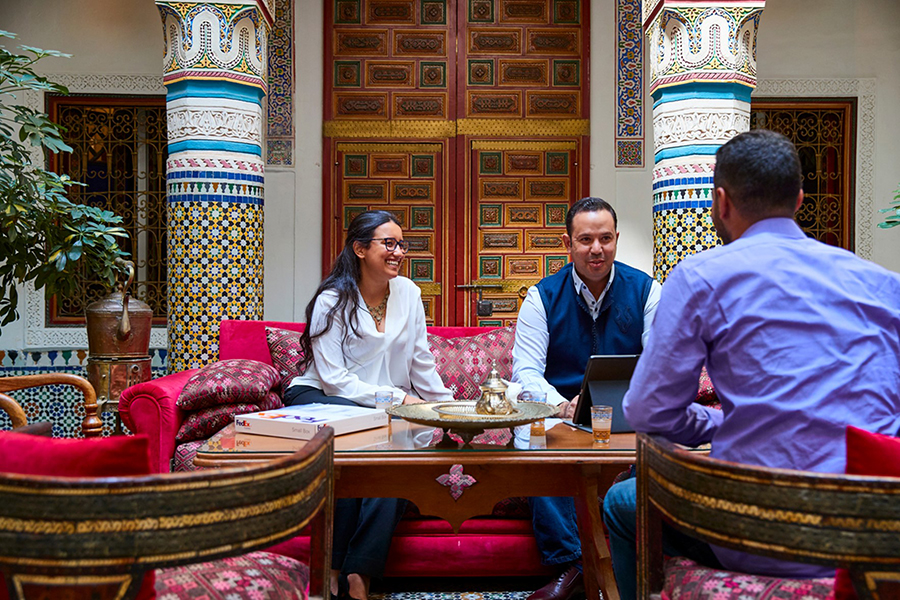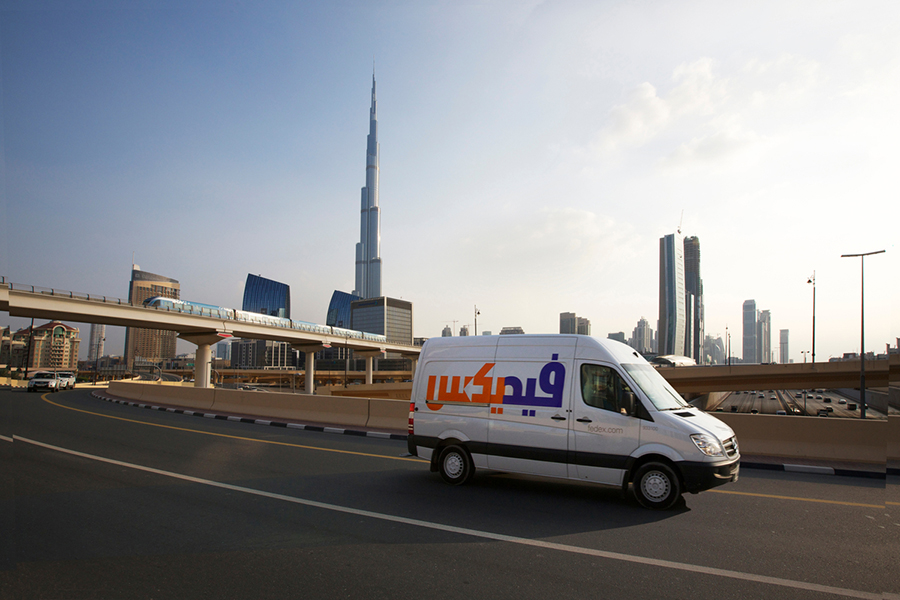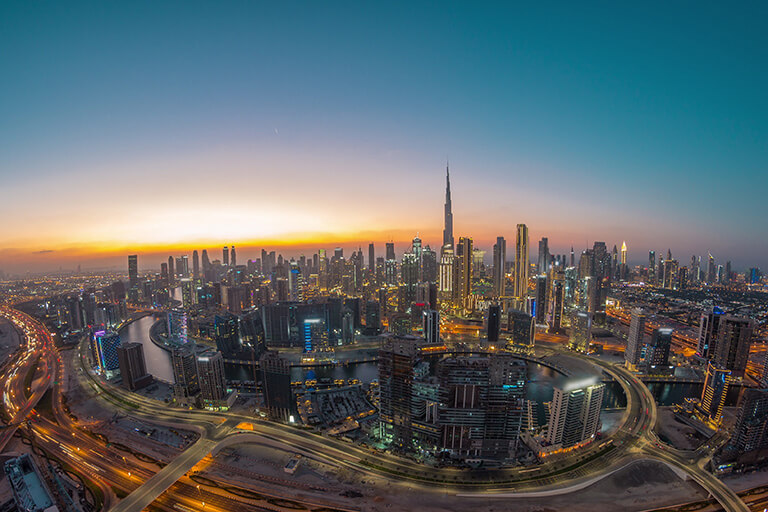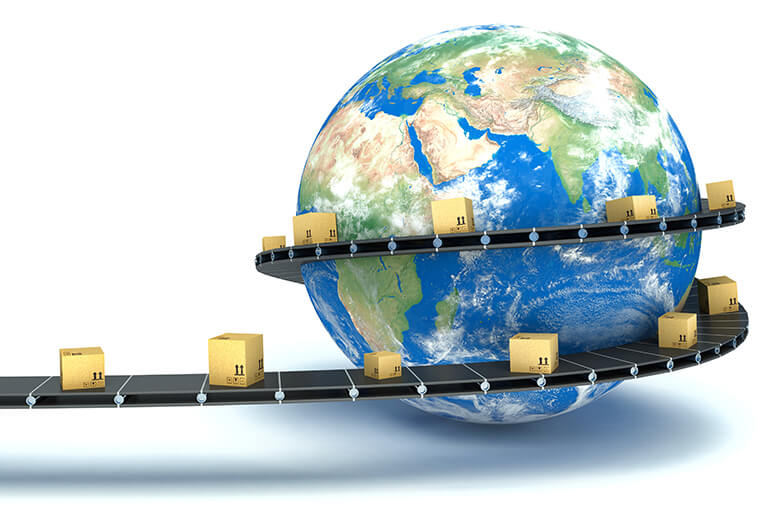Why The World Is Looking To UAE As The Next Global Trade Hub
Fueled by record growth and strategic alliances, the UAE is poised to become the world’s next global trade hub. We explore the key drivers for business and cross-border trade opportunities across the region.
Positioned at the crossroads of the east and west, the United Arab Emirates (UAE) is a futuristic, thriving hub for global trade.
In the first half of 2023, the UAE's non-oil foreign trade reached a record AED 1.24 trillion (approximately USD $338 billion), marking a 14.4% surge compared to the same period in 2022. These figures tell a story. The UAE’s rise in global trade is being driven by expanding trade ties with new economies, and supported by the nation’s robust, technologically advanced logistics sector.
The UAE hasn’t only relied on intrinsic strengths. It has proactively established alliances and trade agreements with overseas countries and major global corporations. A prime example is the UAE and China bilateral trade relationship.
Today, the UAE is China's top trading partner from the Arab region, representing 30% of its total non-oil trade with these countries.
Looking ahead, the trade ties between the UAE and China are anticipated to grow even stronger. The two countries have a combined goal to expand their overall bilateral trade across sectors to reach AED 734 billion (USD $200 billion) by 2030.
The UAE and China have also signed several agreements to enhance trade cooperation, build new partnerships, and provide support to exporters and importers to encourage an uptick in the exchange of goods and services.
In the first half of 2023, the UAE's non-oil foreign trade reached a record AED 1.24 trillion (approximately USD $338 billion), marking a 14.4% surge compared to the same period in 2022. These figures tell a story. The UAE’s rise in global trade is being driven by expanding trade ties with new economies, and supported by the nation’s robust, technologically advanced logistics sector.
Building strategic alliances and collaborations
The UAE hasn’t only relied on intrinsic strengths. It has proactively established alliances and trade agreements with overseas countries and major global corporations. A prime example is the UAE and China bilateral trade relationship.
Today, the UAE is China's top trading partner from the Arab region, representing 30% of its total non-oil trade with these countries.
Looking ahead, the trade ties between the UAE and China are anticipated to grow even stronger. The two countries have a combined goal to expand their overall bilateral trade across sectors to reach AED 734 billion (USD $200 billion) by 2030.
The UAE and China have also signed several agreements to enhance trade cooperation, build new partnerships, and provide support to exporters and importers to encourage an uptick in the exchange of goods and services.

Creating an ecosystem for SMEs to trade
Small and medium enterprises (SMEs) are instrumental in boosting economic growth and job creation in the UAE and China. Yet, to remain resilient and succeed, SMEs need to operate and move goods seamlessly.
This is where projects like the Dubai Traders Market, the region’s first free-zone hybrid retail and wholesale marketplace, come into play. This initiative creates new trade opportunities for SMEs in both countries. However, for small businesses to leverage this opportunity, a strong cross-border trade network, combined with an express logistics provider, is essential.
At FedEx, we operate a vast network of direct flights between the UAE and China, bolstering trade connectivity between the two countries. And we are committed to empowering SMEs with enhanced customer experiences and cost-effective solutions, simplifying the complexities of international commerce.
By partnering with a logistics expert like FedEx, small business owners can access a strong and seamless supply chain, paving the way to new markets and diversifying their sources of revenue.
Leveraging smart logistics for bilateral trade growth
As the UAE pursues its ambitious agenda for re-export development by 2030, the role of the logistics sector becomes even more crucial. Here, the UAE has consistently invested and innovated.
The country already enjoys world-renowned transportation links, ranging from its robust road network to substantial aviation capabilities. Dubai airports offer a combined cargo capacity of 4.5 million tons annually, with connectivity spanning 190 destinations worldwide.
The UAE’s adoption of blockchain for streamlining customs processes and developing smart roads also shows its commitment to cutting-edge tech for more efficient, transparent trade.

Finally, the UAE’s emphasis on state-of-the-art logistics is reflected in the integration of advanced technologies in the new FedEx regional air and ground hub. This hub will incorporate sustainable operations and enhance the overall customer experience with an automated and advanced sorting system, high-speed security screening equipment, cold-chain services, and capabilities to manage dangerous goods.
Such innovations position the UAE as a pioneering player in smart logistics, creating an environment where businesses can trust the system’s efficiency. It is not just about moving goods, but doing so effectively and smartly.
The UAE's rapid economic growth, strategic position, and unwavering commitment to innovation in the logistics sector have cemented its role as a global trade hub. Its collaborative efforts with economies like China, and its support for SMEs demonstrate a clear vision of growth and integration.
To find out how FedEx can help you expand to new markets, head here.
Such innovations position the UAE as a pioneering player in smart logistics, creating an environment where businesses can trust the system’s efficiency. It is not just about moving goods, but doing so effectively and smartly.
The UAE's rapid economic growth, strategic position, and unwavering commitment to innovation in the logistics sector have cemented its role as a global trade hub. Its collaborative efforts with economies like China, and its support for SMEs demonstrate a clear vision of growth and integration.
To find out how FedEx can help you expand to new markets, head here.
***
A version of this article first appeared in Arabian Business.



















 The Latest
The Latest